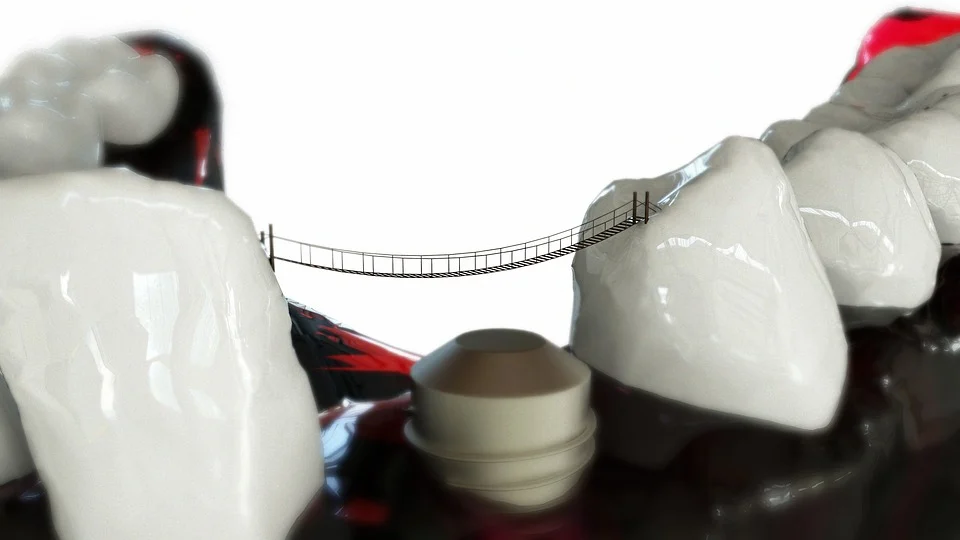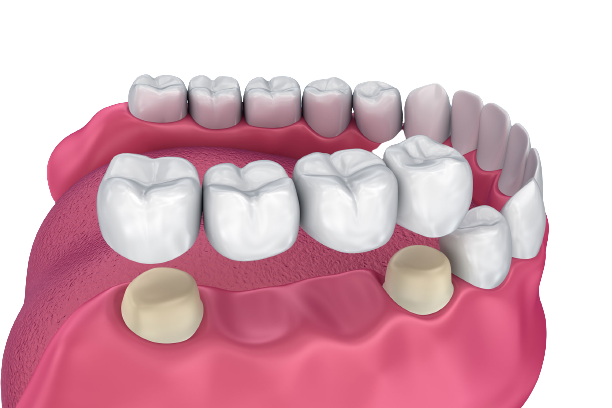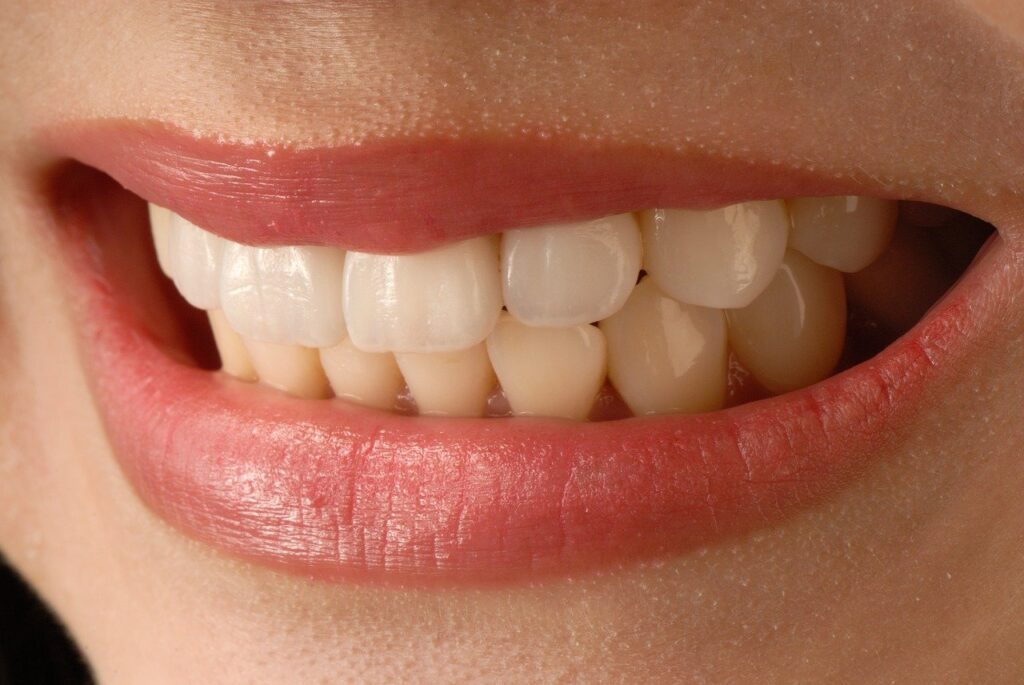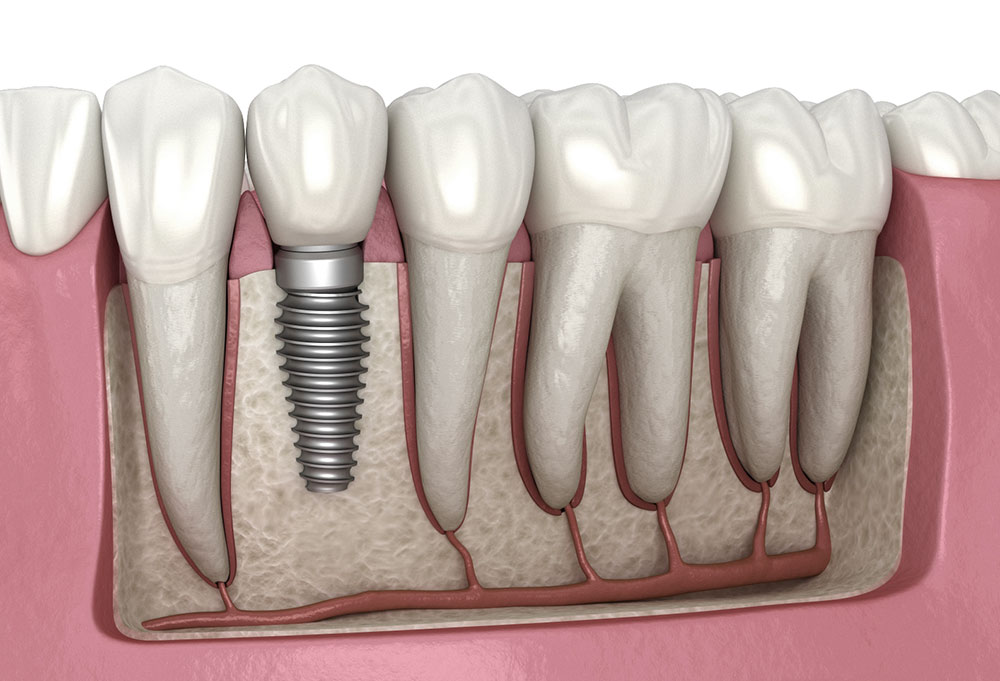
When you have a tooth that needs replacement, you have a few different options available. Dental bridges are popular choices for individuals who want to replace their teeth with natural-looking synthetic copies, while dental implants offer a more permanent, sometimes more effective solution.
While both dental bridges and implants can be effective, they come with different advantages and disadvantages as well as different price points. Let’s break down the difference between bridges and implants in detail. By the end, you’ll know which of these two dental treatments is a better choice based on your needs and budget.
Dental Bridges Explained
Dental bridges are false teeth only held in place by surrounding teeth around an empty socket. For example, if you have a missing tooth in between two healthy teeth (either because of an extraction or an accident), your dentist may install a dental bridge tooth in between those healthy teeth to cover the gap in your teeth.
As a result, dental bridges can restore the look of your smile, help you chew normally, and don’t require a very invasive dental procedure. The false teeth that comprise dental bridges are made from plastic, porcelain, and similar materials so they match the natural color of your teeth. Depending on how many teeth are missing, dental bridges may only be as large as a single tooth or they may cover multiple missing teeth in a row.
You may need a dental bridge if your tooth cannot be recovered because of rot, physical damage, or other factors. For instance, if your tooth must be extracted to prevent a root infection from spreading, your dentist may recommend a dental bridge to replace the tooth once it is taken out.

Dental Bridge Pros and Cons
Dental bridges have several distinct advantages and disadvantages compared to dental implants (with or without dental bridges on top of them).
Pros:
- Easier to get covered by your dental insurance
- Does not require as invasive surgery as dental implants
- Typically cheaper than dental implants
- Only requires a few visits to your dentist over a short time span
- Potentially less discomfort or irritation
Cons:
- Must be replaced every 5 to 7 years, though some dental bridges may last for more than 10 years depending on the materials
- Does not look as natural as the bridge material ages
- Surrounding teeth are more susceptible to cavities or tooth decay compared to implants
- May damage healthy teeth around the missing tooth area
Costs of Dental Bridges
Your dental bridges’ costs can vary widely based on a variety of factors, including:
- What type of material is used to make the bridges
- Where you live
- How long the bridges are supposed to last for
- And more
Generally, you can expect more affordable dental bridges to cost nearly $500 per tooth. More expensive but longer-lasting dental bridges may cost up to $1200 or more. But keep in mind that these quotes do not include the cost of dental crowns that may be necessary to attach a bridge tooth to nearby, healthy teeth.
Fortunately, dental bridges are more likely to be covered by dental insurance, but this is not a guarantee. Contact your insurance provider before deciding to really know what you’ll be expected to pay. You’ll also still have to clean the dental bridges you receive with good toothpaste and a brush (though they are not susceptible to tooth rot in the same way as natural teeth.

Dental Implants Explained
In contrast to dental bridges, dental implants are full artificial tooth roots made from materials like titanium. Dental implants are then mounted into the jawbone itself using screws that hold crowns or bridges in place.
That means dental implants and bridges may be used simultaneously depending on the specifics of your oral care and the advice of your physician. However, dental implants may also be used with other types of artificial teeth.
Furthermore, dental implants may be used to replace the real roots of rotten teeth while preserving the remaining tissue of a formerly healthy tooth. For instance, if you require a root canal but enough of a rotten tooth’s bottom has been destroyed, your dentist may recommend a dental implant in addition to a root canal treatment.
During such a procedure, your oral surgeon will clean out the interior of a run tooth, then replace the root of the original tooth with a dental implant for added stability. The remainder of the tooth, such as the enamel surrounding the tooth’s interior, may remain for aesthetic or stability purposes.

Dental Implants Pros and Cons
Should you or your dentist decide to go with dental implants, you should be aware of the pros and cons associated with this treatment option.
Pros:
- May last for 15 years or even longer depending on the materials used
- Will retain a natural-looking tooth appearance for longer than bridges
- Have a very high success rate over 10 years, typically close to 97%
- Do not typically damage healthy teeth around the implant location
Cons:
- Usually more expensive than dental bridges
- The full dental implant process could take up to six months
- May lead to additional discomfort or surgical complications
- Dental implants are less likely to be covered by insurance
Costs of Dental Implants
As with dental bridges, the cost of your dental implants will vary depending on:
- What kind of implant you decide to get
- How long the implant is meant to last
- How invasive or extensive the procedure is
Generally speaking, dental implants cost between $3000 and $4500 per tooth replaced. Because your dental insurance is less likely to cover the cost of implant treatments, keep this in mind when deciding between both treatments.
Should You Choose a Dental Bridge or Implant?
If you have to get a tooth extracted and must select a replacement, your dentist will likely allow you to choose between receiving a dental bridge or implant. They may make a recommendation one way or the other, but the decision will ultimately be yours.
Dental bridges are usually better if:
- You know that your insurance will cover the cost of the treatment (fully or mostly)
- You don’t have insurance but want to pay for the cheaper option
- You have more than one missing tooth. That’s because dental implants require a separate implant to be surgically attached to the jawbone for each missing tooth, so getting multiple implants is extremely costly and takes a long time
- You don’t want to expose yourself to the risks of dental surgery, either because of personal preference or if you have a medical condition that may slow down your healing, like diabetes or leukemia
- You want to get your teeth issues taken care of more quickly, as dental bridges only take a couple of weeks from start to finish
However, a dental implant may be a better choice for your needs and budget if:
- Your dental insurance does cover the cost of implants
- You have money to spare and don’t mind the extra cost
- You want your implants and false teeth to last for upwards of 10 years
- You only have one missing tooth, as this means you’ll only need one implant surgically attached to your jaw
- A dental bridge is unlikely to be successful given the shape of your mouth, the positions of your teeth, or other factors – your dentist may lend more insight if this is the case
When in doubt, don’t hesitate to speak to your dentist about your options in addition to other false tooth replacements, like partial dentures.
Summary
Overall, dental bridges and implants both serve the same role: filling in gaps where healthy teeth once stood. If you have to get a tooth extracted for one reason or another, a dental bridge or implant can preserve your smile, allow you to chew normally, and prevent your teeth from becoming crooked due to the extra space.
But it’s important to choose a dental bridge or implant wisely, especially when you consider the overall cost of the procedure. It’s also a good idea to take good care of your teeth so you minimize the likelihood of cavities or tooth rot in the future.
Fortunately, you can find everything you need to protect your teeth – including high-quality toothpaste, mouthwash, or even electric toothbrushes – at Dr. Brite. With the right oral care routine, you may not ever need to decide between a dental bridge or implant in the first place. Take care of your teeth with our oral hygiene products today!

